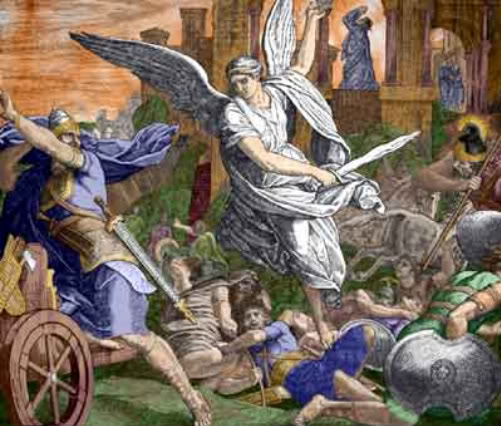Hell as Annihilation
The view of hell called “annihilationism” generally receives considerable pushback from the evangelical community for various reasons. Interestingly enough, many of the reasons provided ordinarily stem from a few overbearing traditionalists (definitely not all) who assert that Christians who hold to annihilation do not take the Bible seriously or are somehow twisting the words of Scripture to make it appear more palatable. The traditional doctrine of hell, they say, is a verifiable certainty, and any interpretation that goes against it must be contrary to the “clear” teaching of Scripture. This post, however, will address the topic of annihilation from the viewpoint that most who adhere to it still adhere to a high view of Scripture and are therefore attempting to still be faithful to Scripture, as best they can, as many traditionalists do likewise.
*Note—I am not trying to be overly exhaustive on this topic because the literature is vast and, therefore, this could end up being 20 pages long. My desire with this post is to provide the 30,000-foot flyover understanding so that many who may be unfamiliar with it can acquire a basic framework to comprehend this doctrine.
Conditional Immortality
Annihilationism is designated as such because it views that the wicked are ultimately annihilated after the resurrection and judgment of Christ. No eternal torment in hell. Accordingly, many who adhere to annihilationism prefer to use the term “conditional immortality” (hereafter, simply CI) because it believes that the human soul is not inherently immortal but is a gift from Christ. Consequently, anyone who does not receive this gift is not granted eternal life. For instance, many point to Scripture, such as Romans 2:7 where Paul states, “to those who by patience in well-doing seek for glory and honor and immortality.” This appears to lend credence to the notion that immortality is not automatically presumed at one’s birth but must be sought out and obtained.
Similarly, 1 Cor. 15:22-23 states, “For as in Adam all die, so also in Christ shall all be made alive.” Lastly, and most importantly, is 1 Tim. 6:16, where the author writes about God, “who alone has immortality.” This verse makes the case that immortality belongs only to God and is not automatically gifted to all humanity upon birth, as is commonly assumed. If God is the only one who naturally has immortality, as this verse demonstrates, then what about human beings? Are we not inherently immortal? It would appear to the author of 1 Timothy that we are not created with immortality. Though many other passages of this nature remain to be investigated, this is but a small sampling of the types of verses that appear to promote CI .
Death and Destruction
Moreover, the sheer number of verses that mention death, destruction, die, being blotted out, etc., outweighs any verse that may indicate eternal torment. For example, Paul makes an emphatic declaration that the wicked will be judged “in flaming fire, inflicting vengeance on those who do not know God and on those who do not obey the gospel of our Lord Jesus. They will suffer the punishment of eternal destruction, away from the presence of the Lord and from the glory of his might” (2 Thess. 1:8-9). Fire does not automatically suggest eternal torment in hell, as many presume this very to indicated, but is often seen as a manifestation of God and/or his judgment.
Likewise, Paul also mentions to the Philippians about their opponents, “This is a clear sign to them of their destruction, but of your salvation, and that from God” (Phil. 1:28). Here, Paul contrasts destruction with salvation which points to those becoming the ultimate destinies of the lost and the saved. Notice, however, Paul’s language of destruction. He never mentions hell or and of the words generally translated as hell such as Gehenna, Tartarus, or Hades (he does mention Hades once, though, in 1 Cor. 15:55, but there is some debate about that because “Hades” does not appear in the earlier manuscripts). There are many, many similar verses of this nature, but overall these demonstrate what believers of CI mean regarding the fate of the wicked.

Genre Specific Hell Verses
Those that appeal to the “clear” passages of eternal torment typically appeal to parables in the Gospels and apocalyptic material in Revelation. These “prooftexts” from the traditionalist side are difficult because of the genre they belong to and, therefore, should be approached with caution along with a serious inquiry into what these texts accurately represent without producing overgeneralized statements such as, “the clear and plain teaching of Scripture is…” while referring to parabolic and apocalyptic material. Hearing from a traditionalist that an individual who believes in annihilation does not take the Bible seriously or that it somehow weakens the “clear teaching” of eternal torment is an accusation that does not belong within the realms of orthodox Christianity (and vice-versa among some conditionalists). Instead, we need to be an audience to each other and hear the other’s side of any given argument.
Those who do adhere to the traditional doctrine of eternal torment admittedly have difficulty with the “destruction” passages. Many of these passages must be interpreted in a manner that words such as die, death, and destruction do not actually mean what the say but rather those words should actually mean eternal torment in hell. Additionally, conditionalists can equally point to “clear and plain” language and say those words mean what they say, and nothing more should be read into them. At this point, it appears that the argument is on the manner of interpretation and how one should view those words within the overall corpus of the Bible. However, if we were to follow a clear delineation of the terms used (especially in the Gospels), then CI probably would have the upper hand due to the large sample of destruction style of words used in the NT.
Gehenna
Most, though not all, who adhere to CI admit they “still believe in hell.” However, they may have a different take on “hell” than what countless traditionalists/separationists may have. Several CI advocates say that Gehenna (characteristically translated as “hell”) is the place of destruction. There is still a resurrection of both the wicked and righteous, where the righteous obtain immortality and move on to eternal life, while the wicked are destroyed in Gehenna. This is a place where some CI supporters may differ. Some believe there is a literal Gehenna and a literal destruction of the wicked and have referred to this event as a “divine execution” where God will consent to destroy all non-Christians in a place called Gehenna. Others may feel that Gehenna is not an ontological location but a symbol of a reality that commences in their destruction. Consequently, there will not be a “formal execution.”
Still, others do not believe in “hell” at all and feel that most of the passages that deal with the resurrection of the wicked are more literary in nature and are equated with the English idiom “wake up dead,” or as Daniel says, “they will awake to shame and everlasting contempt” (Dan. 12:2). They will perish and never regain consciousness again, which constitutes their destruction. One piece of evidence this last set of proponent’s use is in 2 Kings 19:35 when the angel of the Lord put the entire Assyrian army to death. In this account, the author writes of the Assyrians, “and when they arose early in the morning, behold, they were all dead corpses.” Some English translations attempt to account for this idiom by saying “the rest who were alive” or some phrase of its equivalency. The Hebrew, however, lends itself to the original that they essentially “woke up dead.” Though this last option is admittedly not the most prevalent, it does take literary and idiomatic suppositions into account.

Eternal Punishment
Most all CI supporters admit their unified belief in “eternal punishment.” In the book The Fire that Consumes by Edward Fudge, he mentions how the punishment of the wicked is a one-time event that constitutes their destruction, which lasts eternally. I would recommend buying this book on Amazon (found HERE) to anyone who is curious about this topic because it certainly is the defining moment of CI theology. Fudge uses the example in Scripture of other phrases like “eternal salvation” (Heb. 5:9) and “eternal redemption” (Heb. 9:12) to establish that just because a word is attached to “eternal,” it does not mean continuous. If it did mean continuous, then it should then say something comparable to “eternal saving” or “eternal redeeming.” Therefore, if Scripture said, “eternal punishing,” that would be a different case. However, the authors’ language points to a one-time event that lasts an eternity.
Tradition
Most would assume the biggest obstacle to CI, however, is the role tradition plays in the doctrine of hell. Though many early Church Fathers in fact did teach annihilation, it is sometimes difficult to decipher who taught CI and who taught ECT due to language previously discussed like “eternal fire” and “eternal destruction,” because both camps feel that language supports their stance. Nevertheless, it is easy to see how eternal torment has been naturally assumed, especially since the majority were illiterate at that time and had to rely on the church to obtain their official beliefs. Christians generally could not question the church on this matter since almost no one had access to a Bible or could interpret any Scriptures on their own, even if they had a Bible. I have a blog post on the specific topic HERE.

Conclusion
Though I feel there is much, much more to say on this matter, I just wanted to give a simple yet easy-to-understand view of the doctrine of Annihilation to those who may not have heard of its existence before. Whether one believes in CI, traditionalism, or any other form of hell, one thing is clear—we must not strawman the other side and accuse them of “twisting” Scripture to suit their benefit. We cannot comprehend the nature and goodness of God unless we are able to treat our brothers and sisters with dignity and respect. Treating others how we would want to be treated is an excellent way to gain ground with each other and be united with other Christians since we are all in the same family.
Previous blog post on hell as separation is found HERE
Next blog post on Universalism is found HERE
Further Reading:
Clark Pinnock, in Four Views on Hell. Grand Rapids, MI: Zondervan, 1993.
Glenn Andrew Peoples, in Rethinking Hell: Readings in Evangelical Conditionalism. Eugene, OR: Cascade Books, 2014. (There is also their companion website where the book is online for free at www.RethinkingHell.com).


